There are various factors considered when replacing or installing the new kitchen sink. First, you must learn about the best kitchen sink material for your design.
Interestingly, kitchen sink materials come in different styles, designs, colors, sizes, and materials. In fact, there are lots of materials to look through before making a decision.
Among these materials, you will also find those that are durable and resistant to scratches, stains, and scuffs. However, other materials are more delicate and ideal for medium to light use.
Understanding the materials of kitchen sinks can help homeowners make the correct decision. So, if you’re looking for a new kitchen sink, we invite you to continue reading to learn what the best kitchen sink materials might be for your home.
Selecting the Best Kitchen Sink Material for Your Home
⎆ Stainless Steel
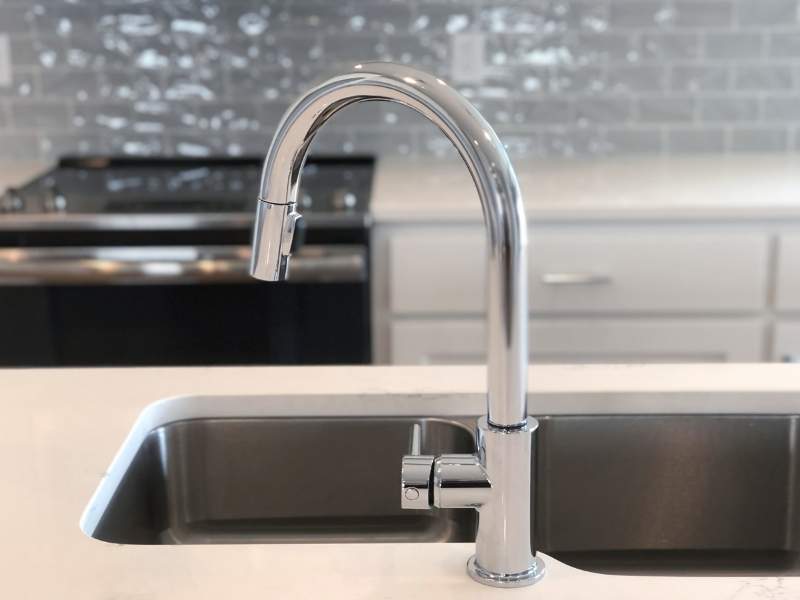
Stainless steel is one of the most durable and affordable materials for kitchen sinks. The stainless steel material is resistant to corrosion and does not allow bacteria to live.
The cost depends on the gauge, which ranges from 16-gauge to 22-gauge. A lower than 18-gauge is regarded as the best stainless steel gauge with high quality.
With a stainless steel sink, you must do regular cleaning to maintain their look. A major drawback with stainless steel is that they start showing spots with time.
Additionally, when you use harsh cleaners, they show scratch marks. Nevertheless, stainless steel material remains a popular option for homeowners.
Pros
- Durable
- They are affordable
- Comes with a variety of sink types including, top-mount, under-mount, and flush mount
- Low cost of maintenance
Cons
- Heavy things cause dents on its surface if they accidentally fall on it.
- They are noisy
- Prone to scratches
⎆ Cast Iron Kitchen Sink
Cast iron is another prevalent material used in manufacturing kitchen sink. As the name suggests, the sink is made by casting iron and finishing it with a porcelain finish to prevent it from rust. The enamel finish also protects the sink from stains and scratches. It also keeps your sink smooth and glassy, making it easy to clean.
The smooth, bright, and shiny appearance of the material makes it one of most individuals’ favorites. Sinks made from cast iron are durable and known to last for many years without losing their natural beauty.
Pros
- Durable
- Versatile in terms of décor
- It looks appealing and shiny
Cons
- Heavy
- Installation can be very involving.
⎆ Copper Kitchen Sink
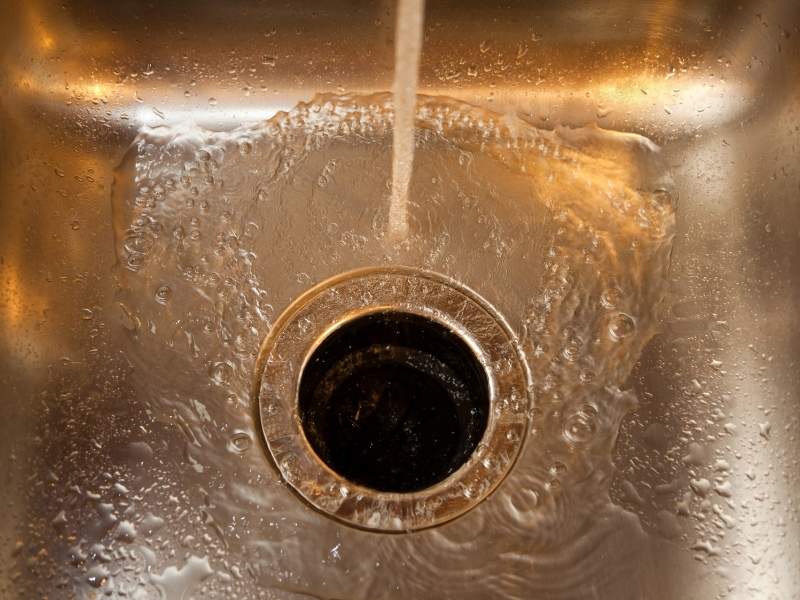
Copper is another unique material for kitchen sinks. Sinks made from copper come in different colors and are normally sealed for corrosion protection. It is nice looking color and a constant shifting surface offers a style that makes the kitchen stand out.
You will usually find copper sinks in high-end kitchens. This sinks gives your kitchen a classy look and is ideal for homeowners who care about their aesthetic kitchen value.
However, copper’s reactive nature results in the development of blue or green patina over time. So, the user must polish it regularly to maintain its nice look.
Pros
- Easily customizable
- Versatile in terms of décor
- Naturally resists microbial growth.
- Resistant to rust
Cons
- Cheaper and thinner sinks are prone to dents and scratches.
- Lacks the capacity to withstand acids, cleaning detergents, and heat.
⎆ Quartz Kitchen Sink
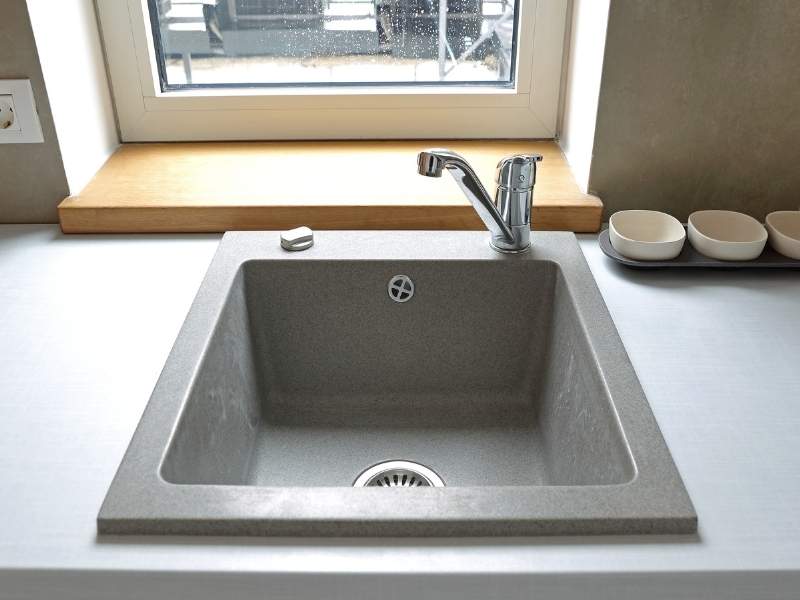
Quartz is an excellent alternative to a granite sink. This material offers continuity through your kitchen counters and sink edges. Their patterns can offer a natural camouflage making the scratches and nicks look natural.
It is another durable material that features a glossy finish and comes in a wide range of colors. The material also requires a degree of care and maintenance with proper cleaning to avoid scratches, stains, and etching.
Pros
- Creates a continuous countertop and sink
- Will not expose tiny scratches.
Cons
- Susceptible to relatively quick wear and tear
⎆ Stone Kitchen Sink
Do you like nature? The stone kitchen sink is one of the sinks made from natural materials. This material can be marble, slate, or granite. The sink is usually made skillfully shaping a single stone and then polishing it to give it a stylish look.
A lovely polished stone sink is attractive to the eye and great for kitchen décor. It is ideal for sinks, tubs, countertops, and many other diverse purposes as well.
Pros
- Offers unique and attractive sinks
- Discourages bacterial growth
- Offers a variety of unique sinks
Cons
- Very expensive
- Susceptible to scratches
- Can develop a patina over time
⎆ Fireclay Kitchen Sink
The fireclay kitchen sink is another common material for making sinks. The sink is made by exposing a mixture of clay and minerals to extreme temperatures. With this sink, you are safe from the nasty rusting that happens to most metallic sinks.
If you decide to go for the best fireclay farmhouse kitchen sink, I recommend reading the sink engineering blog. You should also avoid using it with garbage disposal as this causes cracking due to vibrations.
Pros
- Excellent for farmhouse kitchens
- Easy to maintain
- Heat and stain resistant
- They have an aesthetic value.
- Withstand harsh household chemicals
Cons
- Not cost-effective
- Can chip easily
- Very heavy
⎆ Granite Composite
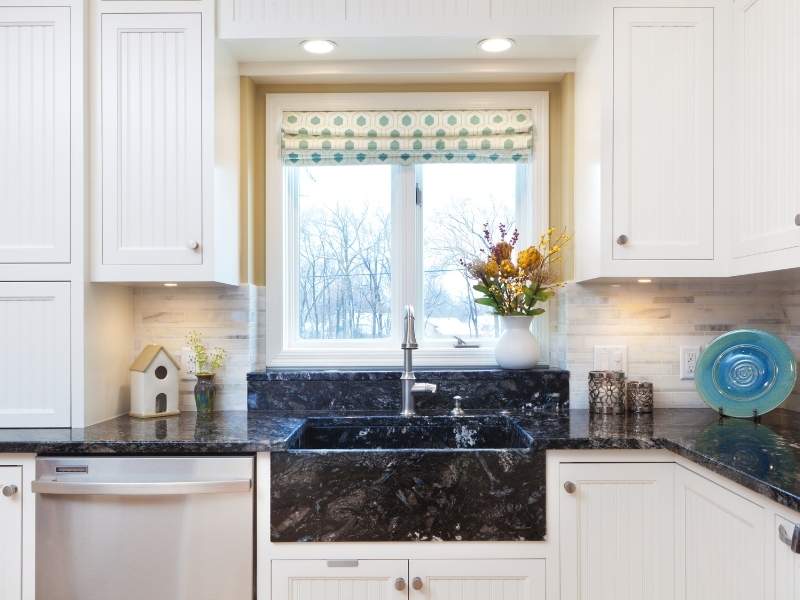
The sink is made from a combination of crushed granite and resin filler in a ratio of 4:1 but can vary slightly depending on the manufacturer. High-quality granite composite is effective and forms a kitchen sink that is durable and non-porous.
This type of sink offers an aesthetic value to your kitchen with an appealing finish that requires minimum maintenance. A sink made from this material is highly resistant to stains, chippings, and scratching.
Pros
- Resistant to heat, chippings, and scratching
- Can withstand acids
- The surfaces are anti-bacterial
- Easy to clean surfaces
- Wide range of models with different colors and sizes
- It gives a natural feel to the kitchen.
Cons
- Heavier than most sink types requiring a more robust worktop
- Available only in matte finishes
- Requires regular maintenance
⎆ Solid Surface Sink
This is another material used in making kitchen sinks. The material is made from resin and minerals that make the material robust and durable. It is versatile and repairable.
Like many other materials, it provides a seamless look throughout the kitchen counters. It is resistant to scratches and can be sanded and polished out easily. The solid surface can also withstand extreme temperatures.
Pros
- Provides a seamless look throughout the counters
- Easy to clean
- Can withstand extreme temperatures
Cons
- Susceptible to scratches, especially if metal scouring pads are used on the sink
- Its durability depends on product color and style.
⎆ Acrylic Sink Material
Acrylic kitchen sink material is made of fiberglass, resin, plastic, and acrylic. The material is attractive and cost-effective.
It is available in different colors and designs. Moreover, its lightweight mechanism enables homeowners to make different sizes of kitchen sinks.
It also makes it ideal for any countertop material for kitchen sinks. Considering its solid material composition, the moderate scratches can be easily sanded and polished out. It is also resistant to stains.
Pros
- Lightweight
- The plastic material won’t break your dishes if they fall in it.
- It is strong and robust.
Cons
- Cannot withstand heat
⎆ Porcelain or Ceramic
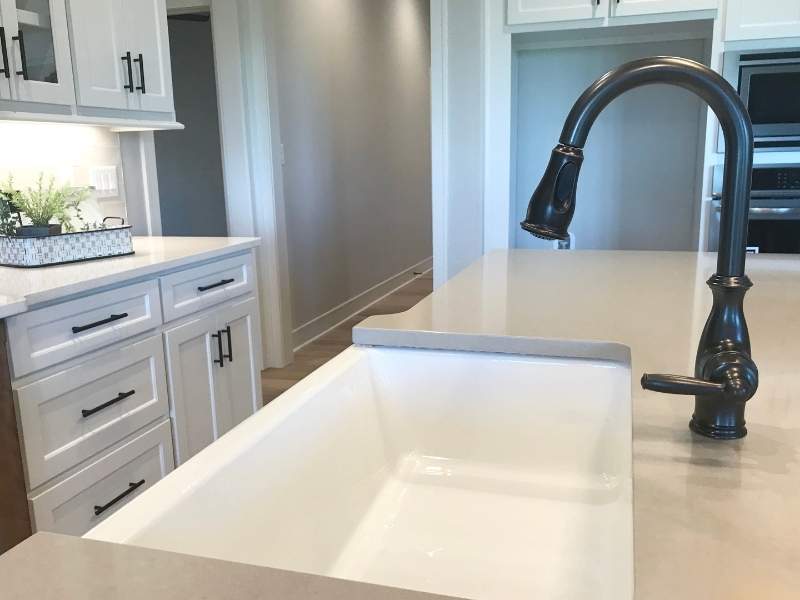
This is another kitchen sink material that has been used for decades for many good reasons. The durable material features a glossy finish and comes in different colors.
The material requires a high degree of care and maintenance to sustain its effectiveness. It is easy to clean and resistant to scratches and stains. If the material is exposed, it can easily form rust.
Pros
- Affordable
- Resistant to cracking and chipping unless a hefty object falls on it
- Provides a glossy and smooth look
Cons
- It is heavy
- It can be challenging when installing, especially in an under-mount sink.
Conclusion
As we have seen above, kitchen sinks are made of different materials that vary in their durability, colors, styles, and designs. Comparing these materials will help you select the best kitchen sink material that fits their decor and style.
When selecting the material, it is important to keep your personal preferences and needs in mind. With proper research, you will find the right material that fits the lifestyle and aesthetic needs.
Images Courtesy of Canva.
Other Posts You Might Enjoy:
8 Effective Tips to Have a Better Kitchen Design
8 Important Tips About New Kitchen Design
3 Suggestions for Efficient Kitchen Layouts
The Benefits of Installing DIY Kitchen Cabinets To Save Money





